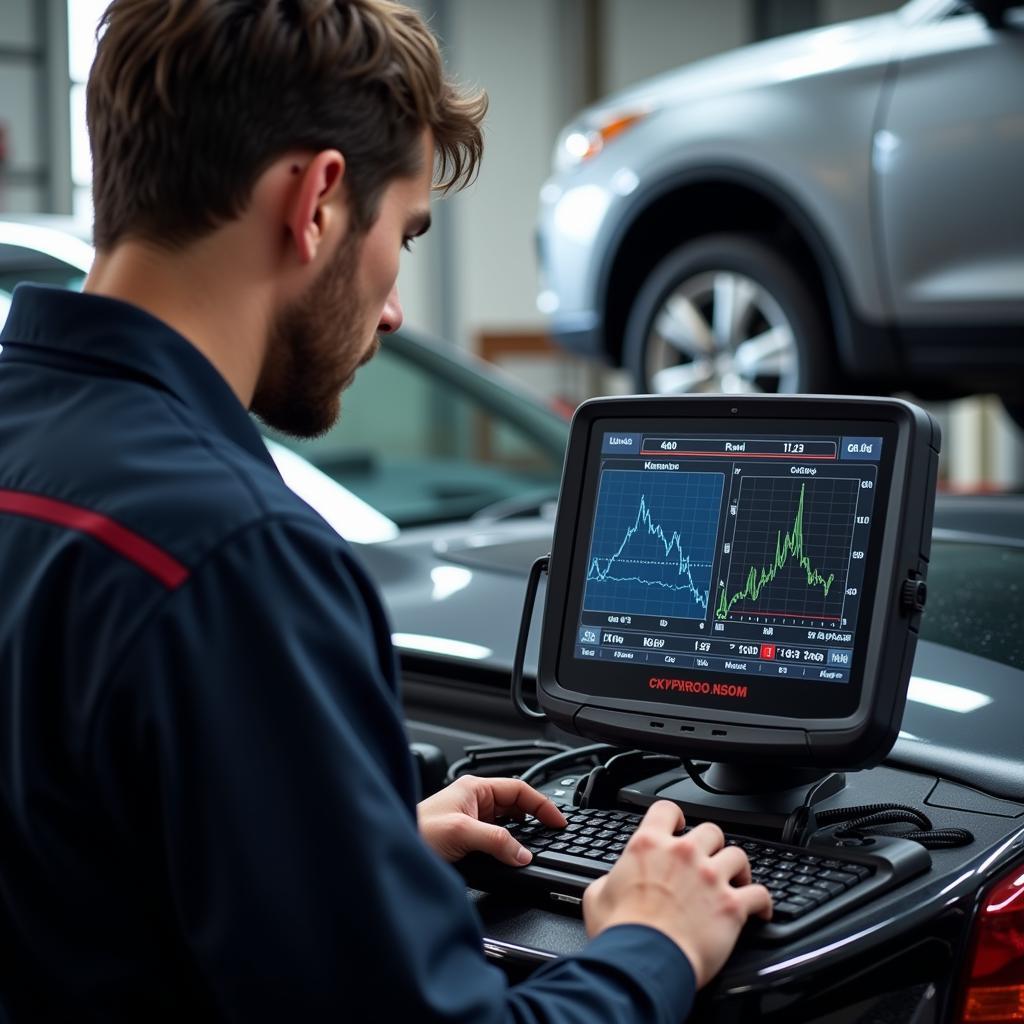When your check engine light flashes, it can feel like you’re staring into a black hole of potential car repair costs. But before you rush to a mechanic, what if you could diagnose the issue yourself? Having a reliable car diagnostic tool can save you time, money, and a whole lot of stress. But with so many options on the market, finding the best cheap diagnostic tool for cars can be overwhelming. This guide breaks down everything you need to know to make an informed decision and get your car back in tip-top shape.
Understanding Car Diagnostic Tools: A Quick Overview
Before we dive into the specifics, let’s clarify what exactly a car diagnostic tool does. Simply put, it’s a device that connects to your car’s onboard computer (ECU) and reads the Diagnostic Trouble Codes (DTCs) stored within. These codes, often displayed as a combination of letters and numbers, act like clues pointing to potential problems within your car’s various systems, like the engine, transmission, or emissions.
Why You Need a Diagnostic Tool: More Than Just Engine Lights
While checking that pesky check engine light is a primary function, car diagnostic tools can do so much more:
- Read & Clear Codes: Identify the root cause of warning lights and clear them after repairs.
- Monitor Live Data: Observe real-time sensor readings like engine RPM, coolant temperature, and oxygen sensor data. This information can be invaluable for DIYers troubleshooting specific issues.
- Component Activation: Test individual components like fuel injectors or ABS solenoids.
- Reset Service Lights: Turn off maintenance reminders after routine services like oil changes.
 Mechanic Using Professional Diagnostic Tool in Auto Shop
Mechanic Using Professional Diagnostic Tool in Auto Shop
Finding the Best Cheap Diagnostic Tool for Cars: Key Features
When searching for a budget-friendly diagnostic tool, it’s essential to look for features that provide the most value for your money. Here are some crucial aspects to consider:
1. OBD-II & CAN Compatibility: Ensure the tool is compatible with your car’s On-Board Diagnostics (OBD-II) system, a standard in most vehicles manufactured after 1996. Additionally, look for CAN (Controller Area Network) compatibility for seamless communication with your car’s electronic modules.
2. Code Reading & Clearing: The ability to read and clear DTCs is a fundamental feature of any diagnostic tool. Opt for a tool that provides clear, concise code definitions for easier troubleshooting.
3. Live Data Streaming: This feature allows you to monitor real-time sensor data, providing valuable insights into your car’s performance and aiding in pinpointing issues.
4. User-Friendliness: A user-friendly interface with intuitive menus and clear instructions is essential, especially for beginners. Consider tools with easy navigation and a well-organized display.
5. Additional Features: Some budget-friendly tools offer additional features like ABS and airbag system scanning, battery voltage monitoring, and freeze frame data capture. While not essential, these extras can be valuable additions for DIY enthusiasts.
how much to run diagnostic on car
Bluetooth vs. Wired Diagnostic Tools: Weighing the Pros & Cons
Choosing between a Bluetooth and a wired diagnostic tool depends on your individual needs and preferences.
Bluetooth Scanners:
Pros:
- Convenience: Wireless connectivity allows for easy maneuvering around your car.
- Portability: Compact size makes them highly portable.
- Additional Features: Often paired with mobile apps for enhanced functionality and data logging.
Cons:
- Battery Dependence: Requires charging and may drain your phone’s battery.
- Limited Range: Bluetooth range can be limited, potentially causing connection issues.
Wired Scanners:
Pros:
- Reliability: Direct connection ensures a stable connection.
- No Battery Required: Powered by the vehicle’s OBD-II port.
- Cost-Effective: Typically more affordable than Bluetooth counterparts.
Cons:
- Limited Mobility: Tethered to the OBD-II port, restricting movement.
- Cable Management: Can be cumbersome to manage cables.
Ultimately, the best choice depends on your specific needs and preferences. If convenience and portability are paramount, a Bluetooth scanner might be ideal. However, if you prioritize reliability and affordability, a wired scanner could be a better option.
where to plug in car diagnostic tool
Top Picks: Best Cheap Diagnostic Tools for Cars
1. ANCEL AD310 Classic Enhanced Universal OBD II Scanner
This compact and easy-to-use scanner offers excellent value for money. It provides comprehensive OBD-II coverage, reads and clears codes for most systems, displays live data, and supports all 10 OBD-II test modes. Its simple interface and plug-and-play functionality make it perfect for beginners.
2. FOXWELL NT301 OBD2 Scanner Live Data
For those seeking more advanced features, the FOXWELL NT301 is an excellent choice. It offers live data streaming, graph display, and the ability to record and playback data for in-depth analysis. Additionally, it supports ABS and airbag system scanning for added functionality.
3. PANLONG Bluetooth OBD2 Scanner for Android & iOS
This Bluetooth-enabled scanner provides convenient wireless connectivity and pairs with a free mobile app for enhanced functionality. It offers real-time data monitoring, DTC reading and clearing, and compatibility with both Android and iOS devices.
how long does diagnostics on a car take
Conclusion: Empowering DIY Car Maintenance
Investing in one of the best cheap diagnostic tools for cars can save you hundreds of dollars in potential mechanic fees and provide peace of mind knowing you can address minor car issues head-on. While professional-grade tools offer advanced functionality, budget-friendly options provide ample capability for most DIYers. By understanding your needs and considering the features discussed, you can make an informed decision and confidently tackle car maintenance tasks.
Remember, even with a diagnostic tool, some car repairs require professional expertise. If you’re ever unsure about a diagnosis or repair procedure, it’s always best to consult a qualified mechanic.

Leave a Reply